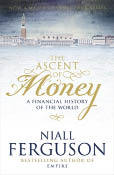The Ascent of Money, by Niall Fergusson
New from Niall Ferguson: the book of the film, or rather, of the series. At any moment now his financial history of the world will take to the small screen and emerge on Channel Four. Programmers and publishers have learned to synchronise these things.
It will be a brave effort, all the same, because finance is not exactly popular just now and has always been unresponsive to film. When Bank Rate comes down, television news producers fall back on a stock picture of the Bank of England, looking like a cheese-mould with a graph imposed on it.
Ferguson helps them out by setting scenes. His book takes us to Chongqing, on the banks of the mighty earth-brown River Yangtse, to meet two of the new breed of Chinese billionaires — she is a property tycoon, he exports motor-bikes.
We move on to Betty’s coffee-stall in El Alto, Bolivia, and watch women in folkloric costume — bowler hats at jaunty angles — as they line up to make payments on their loans. In the Old Town of Edinburgh, Greyfriars Kirkyard is a picturesque setting for the Scottish widows whose mutual fund became a life assurance office and grew up to be taken over for £6 billion by Lloyds Bank. The widows turned out to be cannier than the bankers, and better-looking, too, to judge by the girl in the advertisement — whose father, so Ferguson tells us, is the actor, Roger Moore.
Forward to Memphis, Tennessee, famous for blue suede shoes, barbecues and bankruptcies. Memphis is where Americans go to go bust. One way to achieve this is to default on your mortgage. Another is to buy the worthless mortgage, temptingly wrapped up. Lehman Brothers’ collapse has shown what can be done in this line. It set the dominoes falling all around the world but, by an unhappy accident of timing, Ferguson’s book had already gone to press. Perhaps the televised version will catch up or perhaps — no, certainly — an updated version will come out in paperback.
The story needs telling, for we have it on the authority of the Governor of the Bank of England that our banking system has not been so close to collapse since the outbreak of the first world war. What happened then? Let Ferguson remind you. After three good decades when money had moved freely across frontiers, those frontiers became front lines. Payments were cut off, markets shut down, there was a run on the Bank itself as citizens queued for gold sovereigns. In those days the promise to pay on a banknote still meant what it said.
Not for almost a lifetime did money learn to flow freely once again. Then three more good decades followed — long enough for their effects to be taken for granted. We may now have been frightened enough to know better. We have certainly lived through a demonstration of my Law of the Banking Cycle: disasters happen when the last man who can remember what happened last time has retired.
Ferguson might put that differently. He would agree with Cicero that not to know what happened before you were born is to be a child all your life — and that, he would say, applies to financial history just as much as to any other historical study. Though it may seem abstruse, finance is a human invention, set to serve human purposes and reflecting human nature. No wonder that markets have moods. No wonder, too, that the four most dangerous words to be heard in a market are ‘This time it’s different’. This time, financial engineers came to believe that they had captured a universe of possibilities and, with this, a sure-fire way to make money. There turned out to be more things in heaven and earth than were dreamed of in their philosophy.
They misunderstood risk, not for the first time in markets. As the first world war approached, experts explained that it could not possibly happen. Too much was at stake: the delicate interdependence of our credit-built finance, said Norman Angell, meant that a European war would be suicidal. So it was, but it happened, all the same, and Europe went on to stage a repeat performance. There are plenty of risks in our own world, and much is at stake.
How all this will play out on the small screen, we shall have to see. Perhaps its cheering message will be that the world has survived financial follies and misfortunes without coming to an end. Look out for the paperback.





Comments